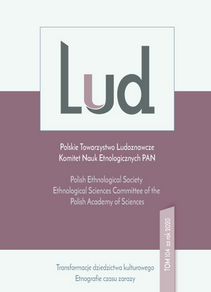BADANIE DZIEDZICTWA NIEMATERIALNEGO W DZIAŁANIU. PERSPEKTYWA KRYTYCZNA, PARTYCYPACYJNA I MEDIACYJNO-FACYLITACYJNA
INTANGIBLE HERITAGE RESEARCH IN ACTION. CRITICAL, PARTICIPATORY AND MEDIATIVE-FACILITATIVE PERSPECTIVE
Author(s): Joanna Dziadowiec-GreganićSubject(s): Cultural history, Museology & Heritage Studies, Cultural Anthropology / Ethnology, Methodology and research technology
Published by: Polskie Towarzystwo Ludoznawcze
Keywords: intangible heritage; critical heritage studies; heterodox theory; authorized heritage discourse; performativity of heritage; theory of practices; heritage mediation and facilitation;
Summary/Abstract: The article introduces the new paradigm that is still relatively unpopular in Poland – both in anthropology and in other disciplines researching cultural heritage in different ways, and interdisciplinary critical heritage studies formed on its basis. They assume, among others, that heritage as a process is a practice centered on the past, implemented in the present and concentrated mostly on the future. It is intangible in its nature so it should be perceived more in terms of a verb than a noun. However, the main purpose of the article is a recommendation of a new methodology in anthropological heritage research inspired by the above critical turn and understood not as an alternative but as supplementing and completing other approaches. Based on heterodox theory and on authorized heritage discourses analyzes, it examines them according to performative, praxeological, mediative-facilitative, and participatory (in action) approaches. Basing on the syncretic research perspective that I suggest, which consists of the selected examples from my own research, I try to show the currently changing role of an anthropologist, who was previously perceived as a “translator”, interpreter and an arbitrator, and now becomes a broker-assistant. As a result, the perception of depositaries changes. They are no longer merely researched, educated, activated, and then monitored according to national and international recommendations and directives based primarily on UNESCO and EU policies that they should implement. Heterodox, participative and mediation-facilitative heritage research puts them in the role of co-explorers, co-researchers and equal, active players who have a real impact on the co-creation and development of the national and global system of intangible heritage safeguarding.
Journal: LUD
- Issue Year: 104/2020
- Issue No: 1
- Page Range: 41-73
- Page Count: 33
- Language: Polish

